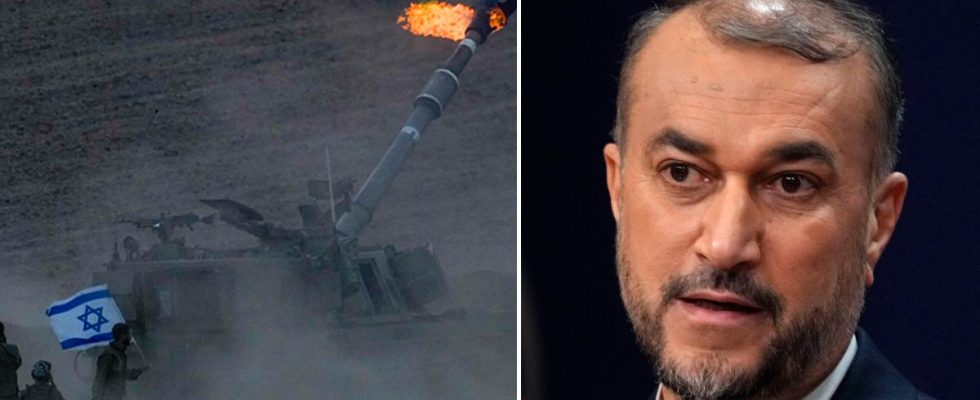Save the article
Iran threatens to intervene if Israel pursues a ground offensive in Gaza.
The country’s foreign minister left that message to the UN on Saturday.
– It is an unusual threat. Iran and Hezbollah usually threaten Israel, but not in this way, says Middle East expert Anders Persson.
The American news site Axios revealed on Saturday evening that Iran’s Foreign Minister Hossein Amir-Abdollahian met with the UN Middle East envoy Tor Wennesland.
The meeting took place in Lebanon’s capital Beirut on Saturday, Axios said, citing two diplomatic sources. According to the paper, Tor Wennesland called on Iran to prevent the conflict from spreading beyond Israel and Gaza.
He then received the answer that Iran “wants to avoid a regional war” and wants to help “free civilians held hostage by Hamas in Gaza”.
But the foreign minister also said Iran has its red lines and singled out in particular a scenario where Israel follows through on its promise of a ground offensive in Gaza. Then “Iran will be forced to respond,” Amir-Abdollahian said, according to Axios.
Also met the Hezbollah leader
After the meeting, Norwegian Tor Wennesland called Israel’s national security adviser Tzachi Hanegbi and other officials to convey Iran’s message, Axios’ sources said.
Earlier on Saturday, Iran’s foreign minister met with the leader of the Iran-backed militia Hezbollah, Hassan Nasrallah, in Beirut. Afterwards, he threatened Israel in a statement to journalists present:
– I know the scenarios Hezbollah has in place. Every step the resistance movement (Hezbollah) takes will cause a great earthquake for the Zionists, he said, according to Politico.
The expert: Unusual
Middle East expert Anders Persson, senior lecturer in political science at Linnaeus University, assesses Axio’s data as very credible:
– The article is written by Barak Ravid, who has very good sources. He is a one-man telegram agency and Israel’s best journalist.
According to Anders Persson, it is unusual for Iran to make threats in this official way via the UN.
– I can’t remember that it has happened before. It is a threat and an ultimatum. It will be interesting to see if they make a move on the matter now that a ground invasion seems imminent in Gaza, he says.
Anders Persson points out, however, what he calls a golden rule, not least when it comes to the conflict in the Middle East: To judge the parties involved by what they do and not what they say.
– Both Hezbollah and Iran’s strategy is to lie and mislead. Are they empty threats or not. We don’t know that. They usually threaten Israel, but not in this way. It stands out and raises the stakes.
Pointing out new possible fronts
Anders Persson points out that a ground offensive in Gaza risks opening up several new fronts in the conflict. He singles out five in particular:
– First: How do the two million Arabs and Palestinians who live in Israel with citizenship react? Then we have East Jerusalem. It’s been a little uneasy there in the last week, but less than you might think.
Anders Persson continues by mentioning the West Bank.
– There it has been quite uneasy after the Hamas attack. Last figure I saw is 56 dead.
The border with Lebanon, where Hezbollah is primarily positioned, is another possible front, according to Anders Persson:
– There has been a lot of shooting back and forth. That in itself would have been great news under other circumstances.
– Neither side seems to want an escalation. One can imagine that Hezbollah and various Palestinian groups that are also there want Israel to draw resources from Gaza. Some observers believe that Hezbollah’s plan is to make Israel burn out on Hamas and then strike.
“Seeking consent from the United States”
Anders Persson also mentions Syria as a potential front, but says there are even more:
– What happens, for example, to the peace agreements with Jordan and Egypt if Israel goes on the attack in Gaza? I think Israel is seeking some kind of support or acquiescence from the United States. A land invasion is complex.
After the Hamas terrorist attack in Israel, there have been reports, including in the Wall Street Journal, that Iran was involved in the planning of the attack.
– Information has come in both directions. The US came out and said there was no evidence of Iran’s involvement. There is no smoking gun.
